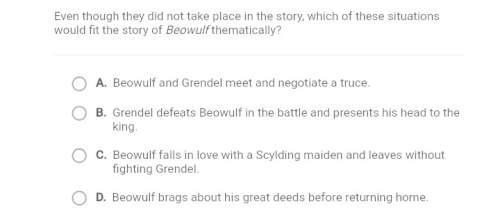Often scyld scefing seized mead-benches
from enemy troops, from many a clan; 5
he terrifi...

English, 04.02.2020 02:01 brookieharrisop5n7us
Often scyld scefing seized mead-benches
from enemy troops, from many a clan; 5
he terrified warriors, even though first he was found
a waif, . for that came a remedy,
he grew under heaven, prospered in honors
until every last one of the bordering nations
beyond the whale-road had to heed him, 10
pay him tribute. he was a good king!
a son was born him, a glorious heir,
young in the courtyards, whom god had sent
to comfort the people —well had he seen
the sinful distress they suffered earlier, 15
leaderless for long. therefore the life-lord,
the ruler of glory, granted earthly honor:
[beow] was famed —his name spread far—
"scyld's son," through all the northern lands.
so ought a [young] man, in his father's household, 20
treasure up the future by his goods and goodness,
by splendid bestowals, so that later in life
his chosen men stand by him in turn,
his retainers serve him when war comes.
by such generosity any man prospers. 25
scyld then departed at the appointed time,
still very strong, into the keeping of the lord.
his own dear comrades carried his body
to the sea's current, as he himself had ordered,
great scylding lord, when he still gave commands; 30
the nation's dear leader had ruled a long time.
loopreviewthere at the harbor stood the ring-carved prow,
the noble's vessel, icy, sea-ready.
they laid down the king they had dearly loved,
their tall ring-giver, in the center of the ship, 35
the mighty by the mast. great treasure was there,
bright gold and silver, gems from far lands.
i have not heard of a ship so decked
with better war-dress, weapons of battle,
swords and mail-shirts; on his breast there lay 40
heaps of jewels that were to drift away,
brilliant, with him far on the power of the flood.
no lesser gifts did they provide him
—the wealth of a nation— than those at his start
who set him adrift when only a child, 45
friendless and cold, alone on the waves.
high over his head his men also set
his standard, gold-flagged, then let the waves lap,
gave him to the sea with grieving hearts,
mourned deep in mind. men cannot say, 50
wise men in hall nor warriors in the field,
not truly, who received that cargo.
then in the strongholds [beow] the scylding
was king of all denmark, beloved by his people,
famous a long time —his noble father
55
having passed away— had a son in his turn,
healfdene the great, who, while he lived,
aged, war-fierce, ruled lordly scyldings.
from healfdene are numbered four children in all;
from the leader of armies they woke to the world, 60
heorogar, hrothgar, and halga the good;
it is told that [yrse was onela's] queen,
bed-companion of the battle-scylfing.
then hrothgar was given victory in battle,
such honor in war that the men of his house 65
eagerly served him, while younger kinsmen
grew into strength.
it came to his mind
that he would command a royal building,
a gabled mead-hall fashioned by craftsmen,
which the sons of men should hear of forever,
70
and there within he would share out
among young and old all god had given him,
except common land and the lives of men.
then, i have heard, the work was announced
to many peoples throughout middle-earth, 75
that they should adorn this nation's hall.
in due time, yet quickly it came to be finished,
greatest of hall-buildings. he, whose word
loopreviewhad power everywhere, said its name, "heorot"—
he broke no promises, but dealt out rings, 80
treasures at his table. the hall towered high,
cliff-like, horn-gabled, awaited the war-flames,
malicious burning; it was still not the time
for the sharp-edged hate of his sworn son-in-law
to rise against hrothgar in murderous rage.


Answers: 2


Another question on English

English, 21.06.2019 15:30
Three types of literature characteristics of the twelfth century are ? sonnets, histories, ballads, elegies, lyrics. select all that apply.
Answers: 1

English, 21.06.2019 22:00
My friends asked me, “are you not coming for the party? "change into passive voice
Answers: 2

English, 22.06.2019 03:30
Hamlet is often called a tragic hero who is torn between thought and action. why does he not kill claudius when he sees him in act iii, scene iii? why does he kill polonius in act iii, scene iv? how do these two actions affect your understanding of hamlet as a man of thought or a man of action? your answer should be at least 250 words.
Answers: 1

English, 22.06.2019 07:30
Which event causes this exchange between abigail and proctor
Answers: 1
You know the right answer?
Questions

Mathematics, 13.11.2020 16:40






Computers and Technology, 13.11.2020 16:40









Chemistry, 13.11.2020 16:40

Engineering, 13.11.2020 16:40


Advanced Placement (AP), 13.11.2020 16:40



